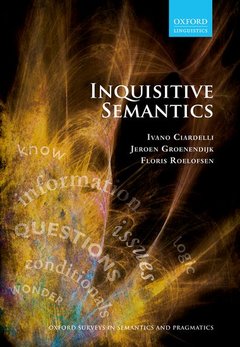Description
Inquisitive Semantics
Oxford Surveys in Semantics and Pragmatics Series, Vol. 6
Authors: Ciardelli Ivano, Groenendijk Jeroen, Roelofsen Floris
Language: English
Subject for Inquisitive Semantics:
43.87 €
In Print (Delivery period: 21 days).
Add to cart
Inquisitive Semantics
Publication date: 11-2018
240 p. · 17.3x24.6 cm · Paperback
Publication date: 11-2018
240 p. · 17.3x24.6 cm · Paperback
114.03 €
In Print (Delivery period: 21 days).
Add to cart
Inquisitive Semantics
Publication date: 11-2018
232 p. · 18x24.9 cm · Hardback
Publication date: 11-2018
232 p. · 18x24.9 cm · Hardback
Description
/li>Biography
/li>
This is an open access title available under the terms of a CC BY-NC-ND 4.0 International licence. It is free to read at Oxford Scholarship Online and offered as a free PDF download from OUP and selected open access locations. This book presents a new logical framework to capture the meaning of sentences in conversation. The traditional approach equates meaning with truth-conditions: to know the meaning of a sentence is to know under which circumstances it is true. The reason for this is that linguistic and philosophical investigations are usually carried out in a logical framework that was originally designed to characterize valid argumentation. However, argumentation is neither the sole, nor the primary function of language. One task that language more widely and ordinarily fulfils is to enable the exchange of information between conversational participants. In the framework outlined in this volume, inquisitive semantics, information exchange is seen as a process of raising and resolving issues. Inquisitive semantics provides a new formal notion of meaning, which makes it possible to model various concepts that are crucial for the analysis of linguistic information exchange in a more refined and more principled way than has been possible in previous frameworks. Importantly, it also allows an integrated treatment of statements and questions. The first part of the book presents the framework in detail, while the second demonstrates its benefits in the semantic analysis of questions, coordination, modals, conditionals, and intonation. The book will be of interest to researchers and students from advanced undergraduate level upwards in the fields of semantics, pragmatics, philosophy of language, and logic.
Ivano Ciardelli is Assistant Professor at the Munich Center for Mathematical Philosophy at Ludwig-Maximilian University. He conducts research in both logic and natural language semantics. Within logic, his work is devoted to bringing out the importance of questions as tools for inference, and to the mathematical investigation of logic extended with questions. Within linguistics, he works mostly on the semantics of conditionals, questions, connectives, modals, and imperatives. He has published on these topics in various journals, including Synthese, Linguistics and Philosophy, Journal of Philosophical Logic, and Natural Language Semantics. Jeroen Groenendijk is Emeritus Professor in the Philosophy Department and the Institute for Logic, Language, and Computation at the University of Amsterdam. His main research fields are logic and philosophy of language, in particular formal semantics and pragmatics. He focuses primarily on the semantics and pragmatics of questions and answers and dynamic semantics and his work has appeared in journals and edited volumes such as Linguistics and Philosophy, The Handbook of Logic and Language, and The Handbook of Contemporary Semantic Theory, among others. Floris Roelofsen is Associate Professor at the Institute for Logic, Language, and Computation at the University of Amsterdam. His main areas of research are formal semantics and pragmatics and the syntax-semantics interface. He has worked on the semantics of questions, modals, quantifiers, disjunction, negation, and anaphora, as well as foundational issues in semantics and pragmatics. His work has been published in journals such as Language, Linguistics and Philosophy, Semantics and Pragmatics, Natural Language Semantics, Journal of Semantics, Linguistic Inquiry, and Journal of Philosophical Logic.
© 2024 LAVOISIER S.A.S.
These books may interest you

Semantics with Assignment Variables 109.06 €

Understanding Semantics 154.17 €

Understanding Semantics 56.06 €

